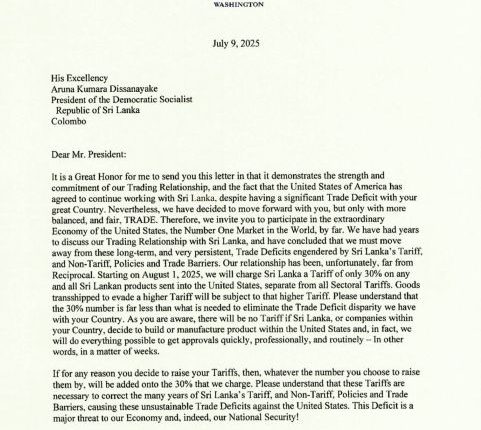Spelling mistakes and tariff threats
What Trump’s blunder says about Sri Lanka’s place in his foreign policy
By Hana Ibrahim
COLOMBO – US President Donald Trump’s latest global tariff warning campaign took an awkward and telling turn this week, exposing not just the administration’s aggressive economic posture, but its startling lack of diplomatic finesse. At the centre of one such episode was Sri Lanka, which received a formal presidential letter from Trump threatening a 30% tariff on exports. The problem? The letter misspelled the President’s name.
Addressed to ‘President Aruna Kumara Dissanayake’, instead of ‘Anura Kumara Dissanayake’, the letter was quickly deleted and replaced with a corrected version. It was one of two high-profile diplomatic gaffes—Trump also misgendered Željka Cvijanović, Chairwoman of the Presidency of Bosnia and Herzegovina, calling her ‘Mr. President’ in an official communication.
For a world leader threatening steep trade penalties, Trump’s inability to accurately name the person he’s addressing is more than a typo—it’s symbolic of a broader disregard for protocol, accuracy, and the dignity of international engagement. In Sri Lanka’s case, it’s an unfortunate reminder of how easily small nations can be brushed aside, even when targeted by superpower policies.
The contents of Trump’s letter were no less troubling. It accused Sri Lanka of imposing “very persistent” trade barriers and warned that all exports to the US would be subject to the new tariff regime beginning August 1. While offering a vague olive branch -“we invite you to participate in the extraordinary economy of the United States”—Trump’s message was clear: comply or be punished.
Yet the focus quickly shifted from the message to the manner. In an age of high diplomacy, where language, tone, and form carry strategic weight, these blunders betray a concerning lack of seriousness. For Sri Lanka, already navigating complex economic recovery and foreign policy realignment, being misnamed by the most powerful office in the world is not just careless—it’s insulting.
Trump’s history of such faux pas is well documented: mispronunciations, incorrect names, and diplomatic errors have plagued his political career. But when such mistakes appear in official state-to-state correspondence tied to economic coercion, they carry new weight. They suggest a transactional and superficial approach to diplomacy—one that can damage long-standing bilateral ties.
Sri Lanka now finds itself lumped together with other nations in Trump’s blanket tariff strategy, yet offered little in the way of engagement, negotiation, or respect. The fact that the Sri Lankan government has not responded—either to the tariff threat or to the corrected letter—may be strategic silence, or it may reflect diplomatic caution in the face of an unpredictable counterpart.
Either way, Trump’s gaffe should not be dismissed as harmless. In global diplomacy, details matter. Names matter. For Sri Lanka, a nation trying to assert itself on the world stage while maintaining a balance of strategic partnerships, even a misspelling speaks volumes about how it is seen—and whether it is truly heard.
As August 1 approaches, it remains to be seen whether Sri Lanka will challenge the looming tariffs, seek dialogue, or hold back. But what is clear already is that in Donald Trump’s worldview, spelling and respect may be optional. Unfortunately, the consequences for small nations like ours are anything but.
-ENCL



Comments are closed, but trackbacks and pingbacks are open.